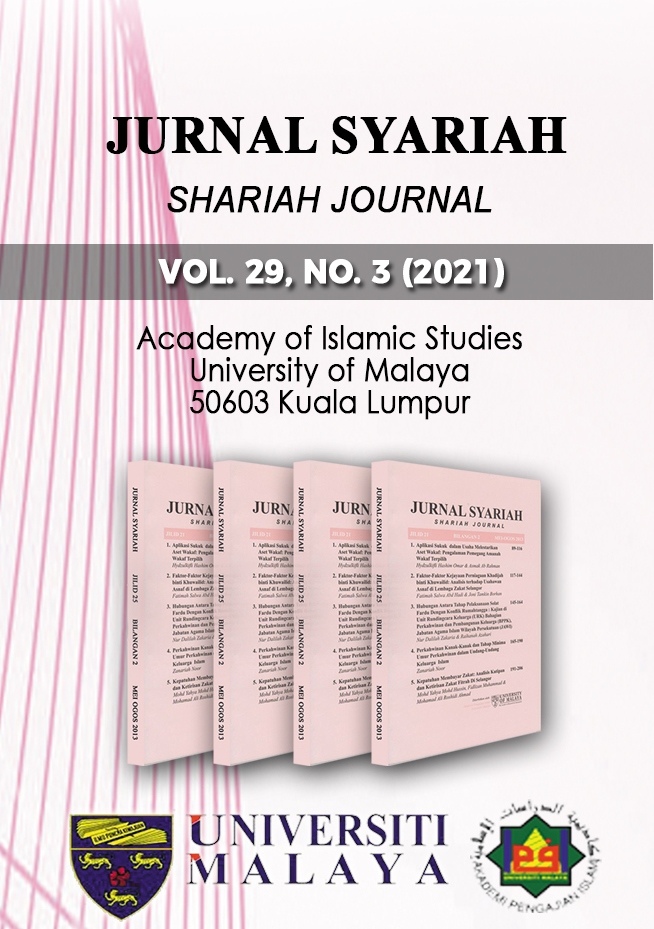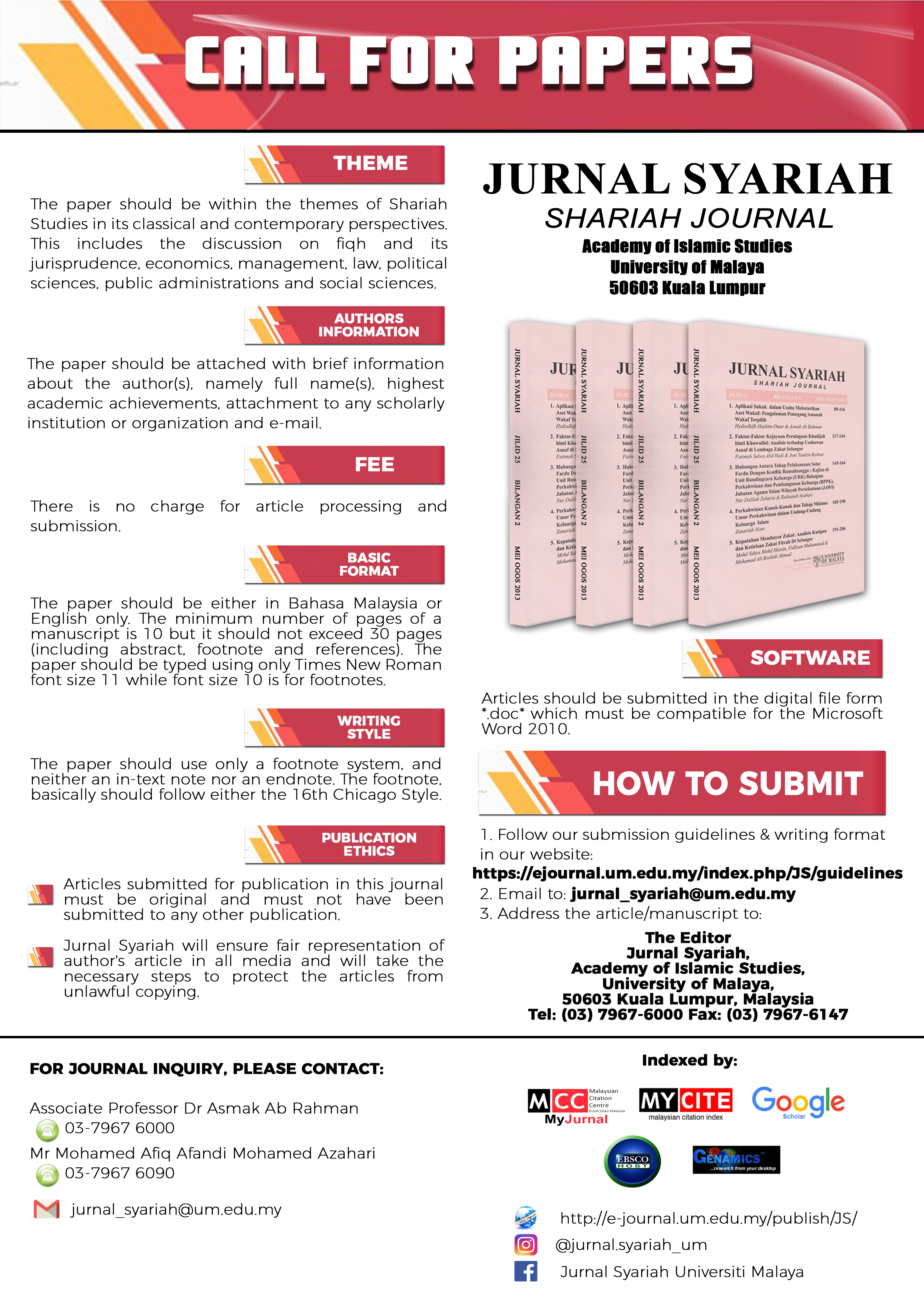A GLOBAL OUTLOOK ON PERMISSIBILITY (ḤALĀL) AND IMPERSIBBILITY (ḤARĀM) ACCORDING TO TAWḤĪD AND SHARIAH
DOI:
https://doi.org/10.22452/syariah.vol29no3.3Keywords:
tawḥīd, Shariah, maqāṣid al-sharī‘ah, complementarity, ontology, epistemology, methodologAbstract
This paper presents a critical outlook of Shariah in contrast to the upholding of tawḥīd as the foundational law of unity of knowledge in the whole of Islamic study of the socio-scientific details and generality. Such a study leads us to widen the scope of Shariah, explained in accordance with the Qur’an, as the way arising from tawḥīd and returning back to tawḥīd as law in an analytical erudition of the ontological and epistemological nature of the world-system (‘ālamīn). Thereby, the treatment of permissibility (ḥalāl) and impermissibility (ḥarām), so often clamored in Shariah, is given a wide conceptual and applied meaning within the ontological and epistemological nature of this study. Several of the Shariah implications in economy, science and society are thereby critically examined by the methodological worldview of tawḥīd as law of unity of knowledge and the pervasively complementary nature of the socio-scientific world-system this builds.
Downloads
References
Asad, M., The Message of the Qur’an (reprinted) (Gibraltar: Dar al-Andalus, 1993).
Ashur, M.T.I., Treatise on Maqasid as-Shari’ah (Herndon, VA. U.S.A.: International Institute of Islamic Thought, 2013).
Attia, G.E., Towards Realization of the Higher Intents of Islamic Law: A Functional Approach of Maqasid as-Shari’ah (Herndon, VA: International Institute of Islamic Thought, 2008).
Auda, J., Maqasid as Shari’ah as Philosophy of Islamic Law (Herndon, VA: The International Institute of Islamic Thought, 2008).
Barrow, J.D., ‘Laws’, in Theories of Everything, the Quest for Ultimate Explanation (Oxford: Oxford University Press, Eng., 1991), 12-30.
Choudhury, M.A. & Malik, U.A., The Foundations of Islamic Political Economy (London: Macmillan, Eng. & St. Martin’s Press, New York, 1992).
Choudhury, M.A., Islamic Economics and Covid-19, The Economic, Social and Scientific Consequences of A Global Pandemic (UK: Routledge, Abingdon, 2021).
Choudhury, M.A., Islamic Financial Economics and Islamic Banking (London, Eng: Routledge, 2016).
Choudhury, M.A., Meta-Science of Tawhid, a Theory of Oneness (New York, NY: New Palgrave, 2019).
Choudhury, M.A., Methodological Dimension of Islamic Economics (Singapore: World Scientific Publications, 2018).
Choudhury, M.A., ‘The Methodology of Islamic economic and socio-scientific Inquiry,’ Research in the History of Economic Thought and Methodology, vol. 30 (2012).
Iqbal, M., Reconstruction of Religious Thought in Islam (Oxford, UK: Oxford University Press, 1934).
Islamic Finance Guru, ‘Sharia-Certified Halal Cryptocurrencies - IslamicFinanceGuru’, accessed on 22 May 2021.
Kamali, M.H., Shari’ah Law: An Introduction (Oxford: Oneworld Publications, 2011).
Kant, I., ‘Critique of Pure Reason. Friedrich,’ C. J. (ed.). The Philosophy of Kant (New York, NY: Modern Library, 1949).
M. Taqi-ud-Din Al-Hilali & M. Muhsin Khan. Translation of the Meanings of the Nobl Qur’an, King Fahd Complex for the Printing of the Holy Qur’an, Madinah, Kingdom of Saudi Arabia.
Mohammed, M.O. & Taib, F. M., ‘The Performance Measures of Islamic Banking based on the Maqasid Framework’, in Islamic Financial Economy and Islamic Banking, ed. Choudhury, M.A. (London, Eng: Routledge, 2016).
Al-Qaradawi, Y., The Lawful and the Prohibited in Islam (al-Halal wa al-Haram fi al-Islam) (Washington D.C. USA: American Trust Publications, n.d.).
Sen, A., Commodities and Capabilities (Oxford: Oxford University Press, 2010).
Al-Shāṭibī, al-Muwāfaqāt fī al-Uṣūl al-Sharī‘ah, trans. Abd Allah Draz (Qāhirah: al-Maktabah al-Tijāriyah al-Kubrā, n.d.).
Tag el-Din, S.I., Maqasid Foundations of Market Economics (Edinburgh, Scotland: Edinburgh University Press, 2013).
Yusuf Ali, The Holy Qur’an, Text, Translation and Commentary (New York, USA: McGregor & Werner, 1946).
Yusuf Ali, The Holy Qur’an, Text, Translation and Commentary (New York: McGregor & Werner, 1946).
Downloads
Published
How to Cite
Issue
Section
License

This work is licensed under a Creative Commons Attribution-NonCommercial 4.0 International License.
COPYRIGHT: All rights reserved. Not allowed to be reproduced any part of articles and contents of this journal in any form or by any way, whether electronic, mechanical, photocopying, recording or otherwise without permission in writing from the Chief Editor, Jurnal Syariah.



















